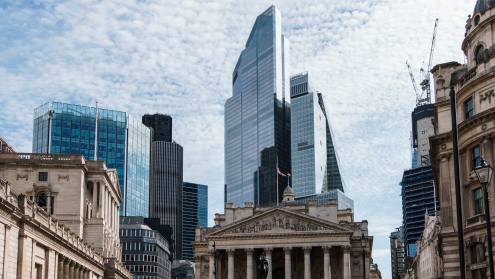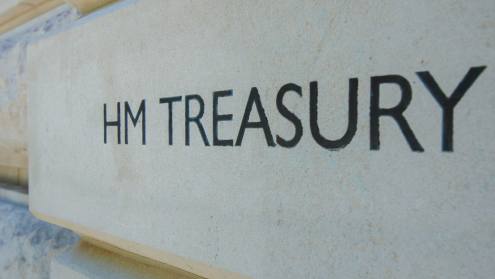If you want to stop stock market prices from falling, why not just intervene? That’s what the Nigerian Stock Exchange tried to do last June as selling pressure mounted. The politically connected elite had been on a margin lending-induced splurge on the exchange, putting some banks at risk. For a week, traders were not allowed to post a buy order if the price was lower than the last recorded sales price. When volumes evaporated, authorities relented and allowed prices to fall by 1% a day. A cap was also put on the upside, at 5% per day.
The consequence for the continent’s third largest exchange was still a big drop in volumes. An investor who believed a stock was worth 20% less than the last recorded selling price simply waited 20 days to sell. Volumes fell from $100m per day to just $10m. However, the measure had some effect. In October, when some African exchanges lost a third of their value, the Nigerian exchange fell just 17%. From November, however, the authorities relented and allowed stocks to fall 5% per day, so market prices more closely match reality.
Worlds apart?
The situation in Nigeria was an extreme reaction to a phenomenon sweeping across Africa’s capital markets. The world’s frontier markets are generally heading downwards, and regulators and market participants have run out of ideas on how to deal with it. Stock brokers have long argued that Africa’s great strength is its lack of correlation with the rest of the world’s markets. That should allow international fund managers to increase returns and reduce the overall risk of their portfolios by including African assets.
But the popular wisdom of low correlation is being proved wrong. Research by pan-African stock brokerage and investment bank African Alliance shows that African markets tend to be strongly correlated with the S&P 500 during periods of rapid movement – either up or down – with the most liquid markets most correlated. This correlation tends to break down during periods of stability. So at the peak of the bull market in 2007 and the precipitous collapse in the second half of 2008, African markets were almost perfectly correlated with the S&P 500. But in-between there was almost no correlation (see Figure 1).
At the bull market’s peak, Africa was getting a lot of attention. As investors chased returns, frontier markets were all the rage, with growth histories beating emerging market indices as well as developed ones. The resources boom was still intact and African economic growth was surging on the back of it. With seven years of 5%-plus economic growth, African returns were already decidedly healthier than developed markets. The political environment was also working in their favour. With the exception of Zimbabwe, many African countries were solidifying democratic and economic reforms. Investors had noted that there was something different about the African story in the 21st century.
Private equity growth
Private equity funds, backed by developed market capital, were springing up from Rwanda to Liberia. Mutual funds dedicated to Africa were opening up in New York and London, some dedicated to assets outside of the heavyweight exchanges of South Africa and Egypt. And new exchanges were being developed in Rwanda and Angola, countries which a few years ago were in the grip of war. Even the Democratic Republic of the Congo was talking about an exchange for companies tapping into its vast mineral wealth.
Other markets had introduced automated trading, built on expensive new software. Brokers were opening up all over the continent, vying for licences on local exchanges. And these bourses were hunting for new listings to boost their liquidity and market capitalisation.
All change
However, all that has changed. November’s meeting of the 20 members of the African Stock Exchanges Association (ASEA) was a sombre affair. Gathered in Kampala, Uganda, representatives were toning down their ambitions. Most had seen indices fall by a third; in hard currencies they were down 50%. The association’s dream of integrated markets seamlessly delivering investment opportunities to the world’s investors was looking a little tarnished.
“It is a difficult time,” says Sunil Benimadhu, deputy chairman of ASEA and head of the Mauritius Stock Exchange, “but that doesn’t prevent us from moving in a direction we think is good. Once the dust settles we will come back. The launch of new initiatives and projects might slow down but people will be working on them in the background.”
The conviction remains that Africa’s capital markets are on a solid growth path, at least in an institutional sense. At the Uganda meeting, ASEA members floated lofty ideas of integrated pan-African markets, new initiatives to encourage greater domestic market participation, but also how to weather an international recession.
The performance of many of Africa’s indices is seen as more due to a vacuum of cash as funds move back into developed home markets than a view on Africa’s economic prospects. “The recent sell-off has more to do with asset liquidation than fundamentals,” says Patrick O’Flaherty, CEO of African Alliance Securities.
Yet the links between Africa’s economies and the developed world’s are growing. Africa is an increasing part of the international supply chain, particularly with regards to raw materials. Nigeria and Angola are major oil producers, Zambia has copper, South Africa platinum, and many more various soft commodities.
Price pressure on those commodities has changed economic prospects in those markets. But other sources of income are also under threat. Remittances from citizens living abroad – for countries such as Malawi and even Nigeria, a major source of foreign earnings – will shrink as host economies come under strain. Foreign aid will also suffer as developed markets shore up their own budget deficits by cutting support. Non governmental organisations (NGOs) will also be hit, as fundraising in developed markets becomes tougher and endowments experience poorly performing asset prices.
International companies
In addition, many of Africa’s listed companies are international majors with secondary listings on African exchanges. One example is Zambia, where copper prices have halved in value in the past five months. The Lusaka Stock Exchange has seen the big copper mines hit hard but the trading pattern has also reflected foreigners’ eagerness to get out of the market.
“We tend to find that when the foreign investors are trading the sentiment is crystal clear. Either they want in or they want out and that reflects in the prices,” says Beatrice Nkanza, general manager of the Lusaka exchange, echoing the correlation findings of African Alliance.
Foreigners hold about 40% of the Lusaka exchange’s assets but account for far more in terms of volume – domestic investors tend to be pension funds who sit on assets. “The credit crunch has affected everybody. We’ve seen that in the levels of foreign trading and also in the bidding patterns. The effort to leave the market has had an impact on prices. There has been a tendency to dump while they can,” says Ms Nkanza.
Zambia has been rapidly developing its market, introducing automated trading last year and vigorously promoting the exchange to ordinary Zambian citizens as a good place for their savings.
Ms Nkanza says: “It’s a bit unfortunate [the bear run] has happened when it has. We have a group of investors who are just getting used to the concept of equity investing, then this. We really will have an uphill battle in the coming year to convince them that this can happen anywhere and it has happened before, but that doesn’t mean capital markets are not a place where money can be made.” The Zambian exchange is now preparing itself for that uphill battle, including convincing companies to continue with the listing plans that Ms Nkanza fears may be shelved.
Stock market culture
The effort to spread the stock market culture to ordinary Africans is important to secure the long-term political sustainability of capitalism on the continent. In Uganda, the stock exchange has 10 listed companies, only four of which trade in any volume during the three weekly trading sessions. The regulator has issued brochures to explain the principles of stock market investing to the average Ugandan. The country’s growing middle class has taken to the exchange but their savings are now coming under pressure.
In Botswana, home to Africa’s wealthiest individuals in terms of gross domestic product per capita, about 5% of the exchange is directly owned by individuals. “We have made a real effort to disseminate information and build the level of interest among retail investors,” says Juliana White, Botswana Stock Exchange corporate affairs manager.
The index’s poor performance has been driven by foreign companies, which account for 10 of the 31 listings. In the third quarter of 2008, the foreign company index declined along with the world’s markets, while purely domestic plays appreciated over the same time. In the last quarter, however, both suffered.
“The markets here have reacted in congruence with the rest of the world,” says Ms White. Like most other African exchanges, Botswana’s is working hard on its institutional development, with plans to introduce automated trading during 2009. In 2008, it dematerialised its scrip and created a central securities depository. Ms White says market conditions make the pace of development tougher, but won’t change direction.
Not uniform
But the continent’s exchanges are not uniform. Ghana carries the distinction of being the best performing exchange in the world in the year to date, having gained 57%. It had a record October, but its key index slid for the rest of 2008. But the exchange was an exception, thanks to a large offshore oil development that will put the country on the oil-producing map and significant government infrastructure spending promises.
With 34 companies traded offline, volumes are thin and some analysts question whether real price discovery is taking place. Swaziland, Malawi and Tanzania’s Dar-Es-Salaam Stock Exchange are also exceptions to the rule with positive gains, but most commentators see these as a function of thin volumes and exceptional domestic factors.
The need to build liquidity on Africa’s exchanges is a key impetus to development. While some people talk of creating one big pan-African exchange, most talk more realistically of steps to harmonise trading standards between exchanges, to cross list companies and to smooth the passage of African savings on to each other’s exchanges.
Much of that is being done at a regional level. East Africa is most advanced, with Kenya’s Nairobi Stock Exchange – one of the continent’s oldest and largest – preparing to merge with the Ugandan Stock Exchange, the nascent Rwanda Stock Exchange and Dar-Es-Salaam Stock Exchange. In west Africa, the exchanges of Nigeria and Ghana have been talking of tie-ups along with the long-discussed dream of economic and monetary integration in the region.
Unified exchange
Francophone west Africa has already achieved this, with a monetary and economic union and a unified exchange – the BVRM – based in Côte d’Ivoire. It has eight member countries and is the world’s first regional stock exchange.
The Southern African Development Community (SADC) has established its own regional exchange organisation with 10 member countries and is working toward seamless trading between the region’s exchanges. “The focus is on what we can do to attract investment to the continent,” says Geoff Rothschild, chairman of the SADC Committee of Stock Exchanges and former chairman of the Johannesburg Stock Exchange (JSE). The committee has been working on standardising listings rules so that companies listed on one exchange can easily list on another. Technology is also being developed to allow members of one exchange to easily trade the securities of another.
“We are looking at a hub-and-spoke connectivity model to give the ability for brokers to trade on the other markets seamlessly,” says Mr Rothschild.
The JSE remains by far the most liquid exchange on the continent, turning over 61% of its $461bn market capitalisation a year. The second-placed Egyptian Stock Exchange has seen turnover spike this year to 90% of its market cap of $85bn, while Nigerian volumes have collapsed on its $46bn exchange.
Most integrated
The JSE is also the most integrated with the rest of the world with indices managed by FTSE out of London, and a broker member list including the world’s largest. But its ability to act as a leader in the development of the continent’s exchanges is only grudgingly accepted.
Ten years ago, the JSE said it would make its trading systems available to SADC exchanges at cost price. Only Namibia, which for decades was economically integrated with South Africa, took up the offer. Other exchanges felt uncomfortable with the idea that their exchanges would, technically, be based on servers sitting in Johannesburg.
The JSE, however, is busy developing an African board that will consist of African companies that are listed elsewhere on the continent. Mr Rothschild says one company is interested and could become the first on the board when it opens in early 2009. Such a board could become the mechanism of choice for global investors looking to gain exposure to Africa’s securities, although Mr Rothschild recognises that the pace of development will be slower in the current environment.
Such innovations are continuing while global investors work their way through the current quagmire. Despite the recent blow to the pace of development, Africa’s exchanges are here to stay, acting as a barometer of political and economic policy on the continent.
They will continue trying to boost domestic investing in their exchanges at the same time as improving systems to better attract international portfolio capital. When frontier investing becomes fashionable again, Africa will be ready.











